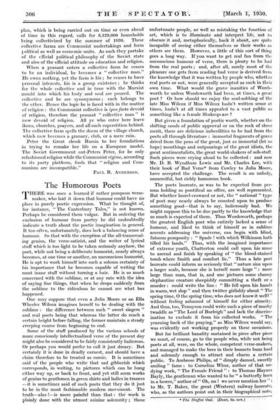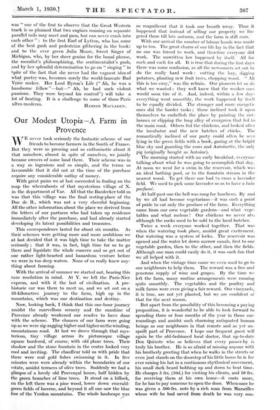The Humorous Poets
THERE was once a learned if rather pompous verse- maker, who laid it down that humour could have rio place in purely poetic expression. What he thought of, for instance, " The Canterbury Tales," is not known. Perhaps he considered them vulgar. But in ordering the exclusion of humour from poetry he did undoubtedly indicate a truth about the poetic imagination in general. It too often, unfortunately, does lack a balancing sense of humour. So that with the exception of the all-transcend- ing genius, the verse-satirist, and the writer of lyrical stuff which is too light to be taken seriously anyhow, the poet, while not being a deliberate humorist, nearly always becomes, at one time or another, an unconscious humorist. He is apt to work himself into such a solemn certainty of his importance that he becomes capable of writing the most inane stuff without turning a hair. He is so much concerned with the sublime, or at any rate with the idea of saying fine things, that when he drops suddenly from the sublime to the ridiculous be cannot see what has happened.
One may suppose that even a Julia Moore or an Ella Wheeler Wilcox imagines herself to be dealing with the sublime : the difference between such " sweet singers " and real poets being that whereas the latter do reach a certain height before-falling, the former maintain a steady creeping course from beginning to end.
Some of the stuff produced by the various schools of more consciously intellectualized verse of the present day might also be considered to be fairly consistently ludicrous. Or perhaps you would prefer to call it just dreary. But certainly it is done in deadly earnest, and should have a claim therefore to be treated as comic. It is sometimes said of the people who write that sad gibberish which corresponds, in writing, to pictures which can be hung either way up, or back to front, and yet still seem works of genius to gentlemen-in green shirts and ladies-in trances —it is sometimes said of such poets that they do it just to be in the most fashionable modern movement. The truth—alas !—is - more painful than that : the work is plainly done- with the utmost aiininesolerii ; 'these • unfortunate people, as well as mistaking the function of art, which is to illuminate and interpret life, not to obscure it and, metaphorically, hack it or are' quite incapable of seeing either themselves or their works as others see them. However, a little of this sort of thing goes a long way. If you want to get real fun from the unconscious humour of verse, there is plenty to be • had from the real poets ; and, after all, surely most of the pleasure- one gets from reading bad verse is derived-from the knowledge that it was written by people who, whether real poets or not, were generally accepted as such in their own time. What would the grave inanities of Words- worth be unless Wordsworth had been, at times; a great poet ? Or how should we enjoy the soul-sobbing of the late Miss Wilcox if Miss Wilcox hadn't written sense at times, hadn't at all times appealed to a vast public as something like a female Shakespc are ?
But given a foundation of poetic worth, whether on the shifting sands of public approval or on the rock of sheer merit, there are delicious imbecilities to be had from the poets all through literature : immortal fragments of grave drivel from the pens- of the great, just as immortal (let us hope) mouthings and outpourings of the great idiots, the great sentimentalists, the great world-shakers of sob-stuff. Such pieces were crying aloud to be collected : and now Mr. D. B. Wyndham Lewis and Mr. Charles Lee, with their book of Bad Verse* from Cowley to Julia Moore, have accepted the challenge. The result is an unholy, unmerciful, but richly humorous book.
The poets laureate, as was to be expected from per- sons holding so pontifical an office, are well represented. But whether -laurel-crowned or not, the " national " type of poet may nearly always be counted upon to produce something good—that is to say, ludicrously bad.. We might suppose this to be due partly to the knowledge that so much is expected of them. Thus Wordsworth, perhaps the greatest English poet who entirely lacked a sense of humour, and liked to think of himself as in sublime accents addressing the universe, can begin with blind, fatuous pomposity : " Spade ! with which Wilkinson bath tilled his lands." Thus, with the imagined importance of extreme youth, Chatterton could call upon his muse to ascend and finish by speaking of " the blood-stained tomb where Smith and comfort lie." Thus a late poet laureate could inform us seriously that " nature sins upon a larger scale, because she is herself more large " : more large than man, that is, and one ,'pictures some clumsy elephantine creature sheepishly committing a theft or a murder : could write the line : " He fell upon his hands in warm, wet slop" and then twitter girlishly about " The spring time, 0 the spring time, who does not know it well?" without feeling ashamed of himself for either atrocity. And thus, too, Tennyson could write such a piece of mushy twaddle as "The Lord of Burleigh" and lack the discrim- ination to exclude it from his collected works. " The yearning back of the praying," as Miss Wilcox would say, was evidently not working properly on these occasions.
But for brilliant banality sustained in piece after piece we must, of course, go to the people who, while not being poets at all, were, on the whole, competent verse-makers, and managed to make the bees in their bonnets buzz loud and solemnly enough to attract and charm a certain public. To Ambrose Philips, of " dimply damsel, sweetly smiling " fame : to Cornelius Whur, author of that un- dying work,• " The Female Friend " : to Thomas Haynes Bayly, the gentleman who wanted to be " a butterfly born in a bower," author of " Oh, no ! we never mention her " ; to Mr. T. Baker, the great (Western) railway laureate, who, as the authors point out in their biographical note, * The Muffed °till.- (Dent, Os. net.) was " one of the first to observe that the. Great Western track is so plarined that two engines running on separate parallel rails may meet and pass, but can never crash into each other" : to the first Earl of Lytton, who has some of the best gush and pedestrian gibbering in the book: and to the ever green Julia Moore, Sweet Singer of Michigan, who, by her sheer genius for the banal phrase, the moralist's philosophizing, the sentimentalist's gush, and by her splendid determination to go on " singing " in spite of the fact that she never had the vaguest idea of what poetry was, becomes surely the world-laureate Bad Verse maker. Her Lord Byron's Life (" Ah, he was a handsome fellow "—but—" Ah, he had such violent passions. They were beyond his control") will take a lot of beating. It is a challenge to some of those Paris

























































 Previous page
Previous page